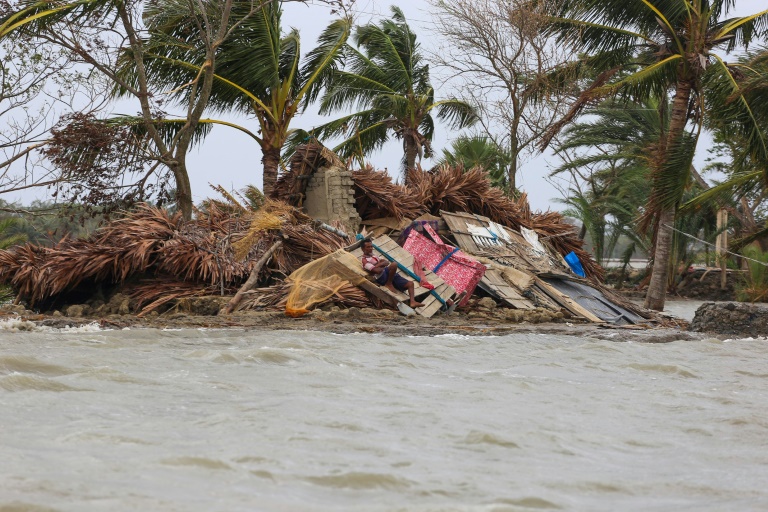Floods and tears in Bangladesh a week after cyclone
()
Khulna (Bangladesh) (AFP) – Rezaul Islam wades through waist-high water, a sack of rice on his head salvaged from what remains of his home, a week after a cyclone savaged Bangladesh and eastern India.
The strongest storm to hit the area this century killed more than 100 people, flattening entire villages, uprooting trees and ruining fish ponds in the Indian state of West Bengal, and south-west Bangladesh.
“We are trying to salvage whatever we can,” 17-year-old Islam told AFP, his house still half-submerged in water left by storm surges unleashed by Cyclone Amphan.
With homes destroyed or uninhabitable, more than 200,000 people in India and at least 100,000 in Bangladesh remain crammed into cyclone shelters — often with little regard to coronavirus precautions.
The most damage caused by Amphan was from the accompanying storm surge, which wrecked several hundred kilometres (miles) of embankments that are supposed to protect homes and farms in low-lying coastal areas.
Locals worked through the night when the cyclone hit, desperately trying to shore up levees with sandbags.
It was mostly to no avail.
Tens of thousands of acres of farmland, fruit plantations and farms have been devastated by the saltwater.
– Roofs ripped off –
In the Bangladeshi town of Koira, thousands like Islam have been trying for days to retrieve belongings from what remains of their homes in the now-desolate landscape.
Many buildings had roofs ripped off by the 165-kilometre-per-hour (100-mile-an-hour) winds of Amphan.
Wells for drinking water have also been polluted and locals are now reliant on the army to deliver supplies.
“I could not salvage anything.All valuable items and furniture have rotted,” said wizened 71-year-old widow Nosimon Begum.
The devastation goes beyond destroyed homes.
Shrimp and crab farming in the area are vital to the Bangladeshi economy — second only to the manufacture of garments for global brands like H&M.
Sanjay Mondol said even before the cyclone, he had lost almost $1 million after the coronavirus pandemic stopped his exports of crabs to customers in China and elsewhere.
The cooperative of around 300 farmers he belongs to saw more than 2,000 acres of washed away by the tidal surge.
“This storm has now broken our backbone.We now have no choice but to beg in the streets,” Mondol said, tears welling up his eyes.
Disclaimer: Validity of the above story is for 7 Days from original date of publishing. Source: AFP.


